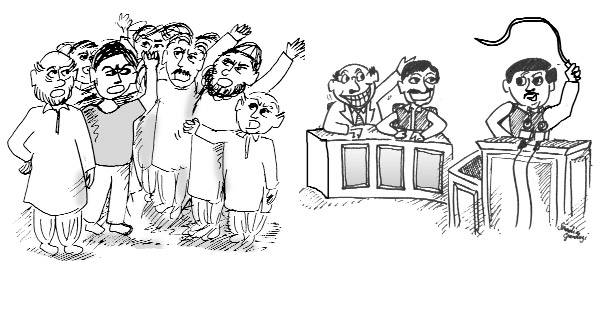
Off track
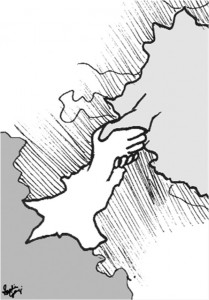
Sir,
The China-Pakistan Economic Corridor – for which an agreement was signed by the prime ministers of the two countries in Beijing in July 2013 – will connect Gwadar port to Kashgar area of China through a highway, a railway track and an oil and gas pipeline. The shortest route for this purpose would be from Gwadar to Panjgur, Kalat, Zhob, Dera Ismail Khan, Swat and then the Karakoram Highway to Kashgar. Such a route will be very helpful for the poverty stricken areas of Balochistan and Khyber Pakhtunkhwa.
But unfortunately, the government has planned to modify that route. The new planned route goes from Gwadar to Karachi, Sukkur, Multan, Lahore, Islamabad and then to Karakaram Highway to Kashgar. It covers key cities in Sindh and Punjab. This route has chosen on the pretext that there is already a road and railway track and may cost less than the route through Balochistan and Khyber Pakhtunkhwa. But in changing the route to go through Punjab’s capital Lahore, the government will ignore the people of Balochistan, who should be the biggest shareholders of this project.
The people of Gwadar have already been ignored in this race to progress. A large majority of them lives below the poverty line. The unemployment rate is high, and the decaying infrastructure and the unpaved dirt roads make the living conditions miserable. The literacy rate is 25 percent, and there is only one college, which is used for boys in the morning and girls in the evening. There are almost no healthcare facilities.
With an ever-increasing sense of deprivation in the province, the first and the foremost responsibility of the government is to take urgent steps for the development of the people of Gwadar and the rest of Balochistan. The government should keep in mind that the change in the route of this project will have very harmful consequences. It will further deteriorate inter-provincial ties and widen the trust deficit between Balochistan and the center. Prime Minister Nawaz Sharif should not concentrate only on his constituency in northern Punjab. He is the prime minister of Pakistan should pay attention to all of Pakistan.
Khalil Murad Baloch,
Lahore.
Above the law
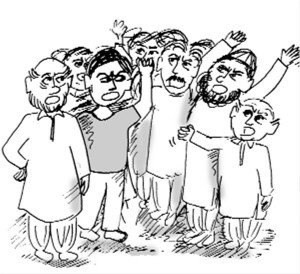
Sir,
It is time political parties, state institutions and everybody else respect mandate given by people to serve them. The MQM has a political mandate to represent the people of Karachi, as long as it respects laws of the land and refrains from forming private militias and taking law in their own hands. The same must apply to other political parties that have influence in the city. Democracy is about rule of law, not of the whims of individual political leaders.
Nobody, not even the civil or uniformed bureaucracy, should be above the law. Nor should they demand immunity from prosecution. In fact, elected political leaders must serve as role models by submitting to the supremacy of the constitution. Taxes must be paid by every citizen, especially those who hold public office. Tax evasion is a conspiracy against the state, more serious a crime than murder, and those caught should be given exemplary punishment and their assets should be seized.
Electoral mandate is not a license to abuse laws, protect criminals, collect extortion and kill those who dare to disagree, nor is it a permit to occupy state or private land, usurp constitutional rights of law abiding citizens, and employ minions and party workers in state owned corporations in violation of merit, thus overburdening them and driving them to bankruptcy. Mandate does not give representatives a right to occupy schools and colleges built in their jurisdiction, denying citizens their constitutional right to seek education, form no-go areas, or plunder state funds allocated for welfare and health services.
Our civil and uniformed services should also perform their designated constitutional duties within confines of the law. As long as the rule of law prevails, the writ of the state is ensured. Otherwise, there will be chaos. And we have already witnessed some of it.
Ali Malik,
Lahore.
Gem of a politician
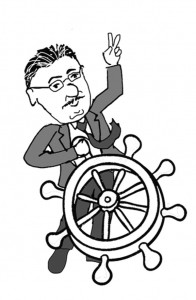
Sir,
A rare gem of a politician that this country has seldom produced his risen to become the chairman of Senate in Pakistan. This person of impeccable reputation and incredible principles is none other than Senator Raza Rabbani. The unanimous approval of his candidature by the political parties in the Senate, even the PML-N, is an out-and-out recognition of his unblemished record and strong principles. What is truly heartening to note is that even PTI Chairman Imran Khan appreciated the nomination of Senator Raza Rabbani for the highest slot in the upper house of the Parliament.
In the entire gamut of developments that took place vis-a-vis the process of nomination of the Chairman of Senate, the point that is worthy of genuine appreciation is that the ruling PML-N ruled out the possibility of horse-trading and political bargaining by accepting the decision of the majority. By openly announcing its support for the opposition’s designated candidate – a former federal minister and a key architect of the 18th Amendment – it buried all speculations circulating in the capital, and everywhere else, about the contest for the slot of the Senate chairman. Not only the political leaders but the entire educated segment of the Pakistani society applauded the premier for setting a new tradition, perhaps for the first in the political history of the country, by fielding a consensus candidate for the office of Senate chairman.
All said and done, it is now time for Mian Raza Rabbani to repay for the confidence posed in him. The best way for him to do so would be to demonstrate neutrality in all his actions and decisions in conducting the affairs of the Senate. He will have to rise above party politics to achieve this vital goal.
M Fazal Elahi,
Islamabad.
Mufti’s mission
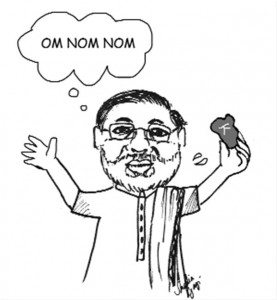
Sir,
As per media reports, a day after Indian prime minister Narendra Modi warned that “any more provocation like the release of separatist Masarat Alam could break the PDP-BJP alliance, the J&K government on Tuesday vowed not to release any more terrorist (separatist) or political prisoner”. This is a sensible step by Chief Minister Mufti Mohammad Sayeed, because if he loses government, then he will not be able to do for the people of J&K what he wants to do. But at the same time five points need to be understood.
One, that Mufti has a track record of remaining open to the viewpoints of separatists. Two, Mufti will not compromise merely for the sake of power and will go to any length for bringing succor to his core constituency in Kashmir valley. Three, he believes the people of J&K especially Kashmiris are unnecessarily suffering (due to AFSPA etc) at the hands of the Indian state including those Kashmiris who are detained and imprisoned allegedly for being separatists – political prisoners as per Mufti’s view. Also, Mufti believes that without solving Kashmir problem economic development is not possible in J&K. And finally, the way from the day (on March, 1) Mufti became the chief minister, the way the Hindu majority India (in its media, through street demonstrations and even in Parliament) has projected Mufti as pro-Pakistan and even a traitor, he should be under no delusion and be prepared for any extent to which India will go to rein him in and stop his so-called anti-national activities.
He should should also understand that he is the only political leader in J&K of the stature of Sheikh Abdullah who sincerely wants an honorable place for the people of J&K under the sun and who has the potential and caliber of changing the destiny of the people for better.
He must realize that good intentions are not enough. Mufti should learn lessons from the political career of Sheikh Abdullah. Without political support of Sheikh Abdullah, hundreds of Nehrus and Patels couldn’t have kept J&K with India but Sheikh Abdullah had to spend 11 long years in jail, only because his party became merely secular but not national, socialist or patriotic.
The National Conference is national only its name, but the People’s Democratic Party is not national in any way. During the time of Sheikh Abdullah, secularism was not in danger, but now Mufti will have to campaign for secularism in India, especially justice for Muslims.
As far socialism is concerned, the credentials of Sheikh Abdullah and his colleagues were impeccable, but like the USSR, Nehru and Indira Gandhi, the NC could not understand that socialism is essentially dependent on deploying state capital profitably first for eradication of unemployment and then for socialist ideals. Therefore, now Mufti will have to champion the cause of socialism at the national level in India if he has to acquire adequate political power.
In a nutshell, in his zeal to get relief for the people of his state, Mufti, like Sheikh Abdullah, may end up in jail if he doesn’t turn PDP into a national, secular and socialist party.
Hem Raj Jain,
Bengaluru.
People and power
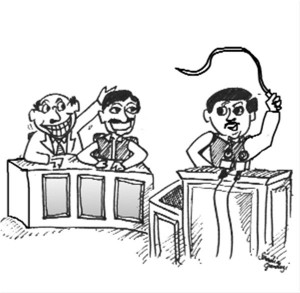
Sir,
The Senate of Pakistan represents the federation and the spirit of the constitution. It is not expected to become hostage to politics of reconciliation, where principles and ethics are sacrificed at the altar of arrogance, greed and power politics. So, whil the unopposed election of Raza Rabbani as chairman of Senate bodes well for the dignity of house, the election of Ghafoor Haideri reflects the opposite. This Machiavellian style political maneuvering, where politics sans ethics and morality are acceptable, makes a mockery of democracy.
Political party leaders can exercise their whip only if the decisions they make hold up to democratic norms and principles in accordance with the spirit of the constitution, otherwise their behavior is akin to that of dictators. In a democracy, elected political leaders are not expected to harbor known criminals, tax evaders, land grabbers and smugglers, nor order police to set free on parole 32 convicted murderers as was done by former president Gen Pervez Musharraf, neither patronize armed criminal militias involved in the most heinous of crimes. Politicians known for their links with terrorists and criminals should not be facilitated to hold public offices of repute, just because it fancies some party leaders who hold their parties to ransom. The ECP is expected to scrutinize candidates, which it has failed to do.
While I hold no brief for the PTI, I am happy that they put up a candidate who was worthy and dignified. In the recent past, the Senate has been belittled when controversial men with billions in their pocket bought seats as if they were buying sheep for slaughter. In a democracy, the dignity of the parliament is reflected by the quality and character of those who are elected and what they stand for. In the words of late John Adams, “The fundamental article of my political creed is that despotism, or unlimited sovereignty, or absolute power, is the same in a majority of a popular assembly, an aristocratic council, an oligarchical junta, and a single emperor.”
Tariq Ali,
Lahore.
Karachi conundrum
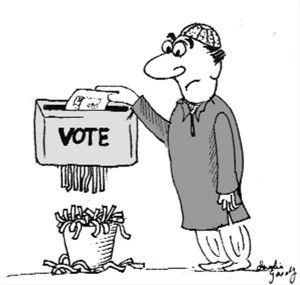
Sir,
Years of failure by the state and its establishment to protect lives, property and basic rights of citizens, or making the right decisions on issues of public interest, has resulted in a widening distrust and disconnect between the rulers and the ruled, leading to a rise in incidents of mob violence and acts of vigilance such as the brutal killing and burning of two men suspected of being involved in acts of terrorism by angry residents of Youhannabad in Lahore. The writ of law must be established and criminals, irrespective of their political, bureaucratic or religious affiliations, must be punished. Failing that, chaos and anarchy will threaten our survival.
Institutionalized corruption and patronization of criminals by security agencies in connivance with inept political godfathers has driven ordinary citizens to desperation, taking laws in their own hands. This has been happening for decades now.
This is a country where property tycoons gift billions to ruling elite in exchange for freedom to vandalize and plunder law abiding citizens of their lifelong savings and land. Successive governments, both civil and military, have allowed Karachi to become hostage to criminal gangs, making it the most dangerous city in Asia. So lucrative was this criminal economy that terrorists based in Afghanistan chose to move to Karachi for a share of the larger pie.
Finally, after over two decades of brutalization by extortion collectors, the state has decided to crack down and restore the writ of law. We are yet to see if it will succeed.
Khalil Khan,
Karachi.

